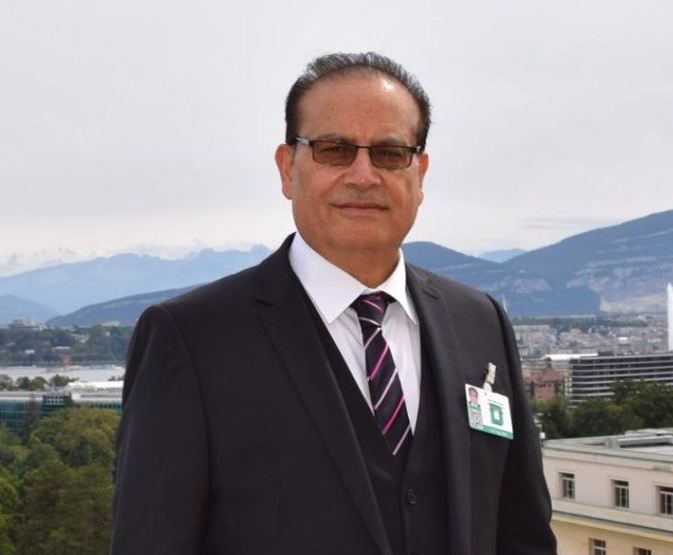By: Qamar Bashir
Yesterday (22.06.2024), the Prime Minister read a statement during a high-level apex meeting held to seek his approval for the new and updated National Action Plan. He read the written statement placed before him verbatim, whereas he usually prefers to speak extempore using lofty words that often recycle. Part of his statement, loaded with expressions that have future consequences on freedom of expression, speech, and press, conveyed the message of upcoming laws, rules, and regulations intended to further curb the already limited freedom of expression, speech, and press in the country, despite being unrelated to curbing terrorism.
Unlike his usual self, he ensured that he read each and every word placed before him. He stated, “For a long time, Pakistan’s social space has been bloodied by enemies of the country to create conflict among our people, spread confusion, and distort and stigmatize the national narrative, bringing, God forbid, disrepute to the country. Under the constitution, everyone has freedom of speech and freedom of expression, but it’s wrongful use, flouting and tearing apart the constitution, and spewing venom against Pakistan’s progress, development, security, and stability could not be a bigger crime against the nation and the country.”
He continued, saying, “We will make new laws and rules to ensure that the government’s voice is made stronger…to ensure that the true story of the country is heard by everyone, making sure that misinformation and lies cannot hide the truth.” Referring to his visit to China, he said that enemies from outside the country and friends like enemies within the country use filth and dirty campaigns to undermine the successful outcome of the visit.
He added, “Therefore, we will bring such laws and rules that can stop this irregularity and hateful speech, putting an end to efforts aimed at creating division within the nation…..let us decide with full determination and resolve to implement those plans…and lay the foundation of prosperity and development.
The key word used here is “enemy.” The enemy could be foreign countries, our immediate neighboring countries, foreign intelligence agencies, or it could be those Pakistanis who allegedly were blamed for attacking the armed forces’ installations on May 9th. In plain terms, this includes PTI leadership considered as masterminds, the workers, supporters, and activists who abetted, facilitated, and executed the attacks, and all those political activists who are criticizing the government and armed forces of Pakistan on social media from within the country and outside the country.
If this is the scenario, then all the foreign governments and foreign agencies and Pakistani expatriates operating outside the country, who allegedly are poisoning the social space, will be outside the jurisdiction of the purported new laws, rules, and regulations. Therefore, for all practical purposes, these laws will be made only for those Pakistanis who are still residing within the country.
Common logic dictates that the people of a country, no matter how gravely and contemptuously the sitting government and its institutions perceive them, should not and cannot be termed as enemies. Therefore, the Prime Minister should have used proper and appropriate vocabulary while distinguishing foreign elements hostile to the country and domestic critics.
He could have rephrased it as follows: “While foreign adversaries seek to undermine our nation’s stability, we must also consider the impact of domestic actions that can weaken our collective resolve. Criticism is a fundamental right enshrined in our constitution, but when it crosses the line into spreading misinformation and inciting division, it becomes detrimental to our progress and security. Therefore we will introduce measures to target the malicious use of media by those seeking to harm Pakistan’s interests, both externally and internally.
Another question which arises is that given the existence of over 52 laws that directly and indirectly govern the media, and which have already granted extraordinary powers to both Federal and Provincial governments to control traditional and social media, often using brute state power to target journalists and media persons without following official procedures, and considering that Pakistan is already ranked 150th out of 180 countries on the Freedom of Press Index, what additional powers and actions does the government thinking to acquire by enacting new laws?
Hypothetically, presuming that the government might be thinking of introducing the National Media Regulation and Accountability Act aimed at enhancing licensing and registration requirements for all media organizations, including digital platforms. The licensing process could involve stringent vetting criteria to ensure compliance with national security standards, granting the government greater control over which entities are allowed to operate.
One component of the act could be to require all media outlets, including social media platforms, to implement government-approved content moderation tools to filter and remove content deemed harmful or seditious in real-time.
Additionally, media organizations could be required to submit periodic reports on their content moderation activities to a central regulatory body enabling the government to maintain oversight of media content and ensure that potentially harmful information is swiftly addressed.
The act may also include national security and public order clauses that criminalize the dissemination of any content which criticizes the armed forces and government. Violations would result in severe penalties, including heavy fines, suspension of licenses, and imprisonment for responsible individuals to serve as a deterrent against the publication of content that the government deems harmful.
The government may establish a National Media Oversight Committee comprising government officials, security agency representatives, and select civil society members aligned with the government’s interests to enforce regulations, issue fines, and recommend the suspension of licenses.
Additionally, the government would fast-track the establishment of special media courts to handle cases of non-compliance swiftly and to ensure that actions against media entities are executed efficiently, minimizing delays in enforcement.
Government in partnership with technology firms is and will invest in advanced surveillance and content analysis technologies to monitor media activities comprehensively to further strengthen the government’s oversight mechanism and maintain robust control over media content ensuring that national security and public order are maintained.
While these measures would enable the government to control and filter content that it perceives as contemptuous and against its vested interests, they would simultaneously gravely wound one of the most important pillars of the state: the media, an indispensable pillar of a vibrant and functional democracy.
By: Qamar Bashir
Former Press Secretary to the President
Former Press Minister to the Embassy of Pakistan to France
Former MD, SRBC












